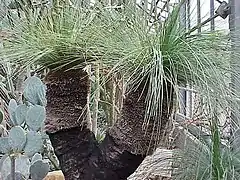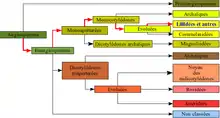Xanthorrhoeaceae
La famille des Xanthorrhoeaceae (Xanthorrhoéacées ou Xanthorrhœacées) regroupe des plantes monocotylédones.

| Règne | Plantae |
|---|---|
| Sous-règne | Tracheobionta |
| Division | Magnoliophyta |
| Classe | Liliopsida |
| Sous-classe | Liliidae |
| Ordre | Liliales |
Répartition géographique

Ce sont des arbustes, des plantes arborescentes ou des plantes presque acaules, pérennes, à feuillage persistant, aux organes souterrains rhizomateux ou tubéreux.
Étymologie
Le nom vient du genre-type Xanthorrhoea donné en 1798 par le botaniste britannique James Edward Smith (1759-1828)[1], qui vient du grec ancien ξανθος / xanthos (« blond, jaune, doré ») et ροεα / rhœa (« qui coule, s'écoule »), signifiant littéralement « coulée jaune », en référence à la résine jaune qui s'écoule de la plante[2].
Classification
En classification classique de Cronquist (1981)[3], cette famille est assignée à l'ordre des Liliales, dans la classe des Liliopsida.
La classification phylogénétique APG (1998)[4] assigne cette famille à l'ordre des Asparagales.
En classification phylogénétique APG II (2003)[5], cette famille peut inclure, optionnellement, les plantes autrefois assignées aux familles des Hemerocallidaceae et des Asphodelaceae.
La classification phylogénétique APG III (2009)[6] inclut dans cette famille les genres précédemment placés dans les familles des Asphodelaceae et des Hemerocallidaceae (les genres Hemerocallis, Phormium entre autres).
En classification phylogénétique APG IV (2016)[7], la famille des Asphodelaceae se substitue à la famille des Xanthorrhoeaceae.
Liste des genres
Selon World Checklist of Selected Plant Families (WCSP) (4 mai 2012)[8] :
- Agrostocrinum F.Muell. (1860)
- Aloe L. (1753)
- Arnocrinum Endl. & Lehm. (1846)
- Asphodeline Rchb. (1830)
- Asphodelus L. (1753)
- Astroloba Uitewaal (1947)
- × Astroworthia G.D.Rowley (1967)
- Bulbine Wolf (1776)
- Bulbinella Kunth (1843)
- Caesia R.Br. (1810)
- Chortolirion A.Berger (1908)
- Corynotheca F.Muell. ex Benth. (1878)
- Dianella Lam. ex Juss. (1789)
- Eccremis Willd. ex Schult. & Schult.f. (1829)
- Eremurus M.Bieb. (1832)
- Gasteria Duval (1809)
- Geitonoplesium A.Cunn. ex R.Br. (1832)
- Haworthia Duval (1809)
- Hemerocallis L. (1753)
- Hensmania W.Fitzg. (1903)
- Herpolirion Hook.f. (1853)
- Hodgsoniola F.Muell. (1896)
- Jodrellia Baijnath (1978)
- Johnsonia R.Br. (1810)
- Kniphofia Moench (1794)
- Pasithea D.Don (1832)
- Phormium J.R.Forst. & G.Forst. (1775)
- Simethis Kunth (1843)
- Stawellia F.Muell. (1870)
- Stypandra R.Br. (1810)
- Thelionema R.J.F.Hend. (1985)
- Trachyandra Kunth (1843)
- Tricoryne R.Br. (1810)
- Xanthorrhoea Sm. (1798)
Selon NCBI (16 avr. 2010)[9] :
- sous-famille Asphodeloideae (correspondant à l'ancienne famille Asphodelaceae)
- Aloe
- Asphodeline
- Asphodelus
- Astroloba
- Astroworthia
- Bulbine
- Bulbinella
- Chortolirion
- Eremurus
- Gasteria
- Haworthia
- Hesperaloe
- Jodrellia
- Kniphofia
- Lomatophyllum
- Poellnitzia
- Trachyandra
- sous-famille Hemerocallidoideae (correspondant à l'ancienne famille Hemerocallidaceae)
- Agrostocrinum
- Arnocrinum
- Caesia
- Corynotheca
- Dianella
- Eccremis
- Geitonoplesium
- Hemerocallis
- Hensmania
- Herpolirion
- Johnsonia
- Pasithea
- Phormium
- Rhuacophila
- Simethis
- Stawellia
- Stypandra
- Thelionema
- Tricoryne
- sous-famille Xanthorrhoeoideae
Selon Angiosperm Phylogeny Website (20 mai 2010)[10] et DELTA Angio (16 avr. 2010)[11] :
- Xanthorrhoea Smith
Notes et références
- E. Charles Nelson et D.J. Bedford, « The names of the Australian grass-tree: Xanthorrhoea Sm. and Acoroides C. Kite (Xanthorrhoeaceae) », Botanical Journal of the Linnean Society, vol. 112, no 2, , p. 95–105 (OCLC 664816018, DOI 10.1006/bojl.1993.1044, S2CID 91163322) ResearchGate Publication 229812945
- (en) David Gledhil, The Names of Plants, Cambridge University press, , 426 p. (ISBN 978-0-5216-8553-5, lire en ligne), p. 408
- (en) Arthur Cronquist, An Integrated System of Classification of Flowering Plants, New York, Columbia University Press, (ISBN 0-231-03880-1, OCLC 1136076363, lire en ligne)
- (en) Angiosperm Phylogeny Group, « An ordinal classification for the families of flowering plants », Annals of the Missouri Botanical Garden, Jardin botanique du Missouri, vol. 85, no 4, , p. 531–553 (ISSN 0026-6493, 2162-4372, 0893-3243 et 2326-487X, DOI 10.2307/2992015, JSTOR 2992015, lire en ligne)
- (en) Angiosperm Phylogeny Group, « An update of the Angiosperm Phylogeny Group classification for the orders and families of flowering plants: APG II », Botanical Journal of the Linnean Society, Wiley-Blackwell, Linnean Society of London et OUP, vol. 141, no 4, , p. 399–436 (ISSN 0024-4074 et 1095-8339, DOI 10.1046/J.1095-8339.2003.T01-1-00158.X)
- (en) Angiosperm Phylogeny Group, « An update of the Angiosperm Phylogeny Group classification for the orders and families of flowering plants: APG III », Botanical Journal of the Linnean Society, Wiley-Blackwell, Linnean Society of London et OUP, vol. 161, no 2, , p. 105–121 (ISSN 0024-4074 et 1095-8339, DOI 10.1111/J.1095-8339.2009.00996.X)
- (en) Angiosperm Phylogeny Group, « An update of the Angiosperm Phylogeny Group classification for the orders and families of flowering plants: APG IV », Botanical Journal of the Linnean Society, Wiley-Blackwell, Linnean Society of London et OUP, vol. 181, no 1, , p. 1-20 (ISSN 0024-4074 et 1095-8339, DOI 10.1111/BOJ.12385)
- WCSP. World Checklist of Selected Plant Families. Facilitated by the Royal Botanic Gardens, Kew. Published on the Internet ; http://wcsp.science.kew.org/, consulté le 4 mai 2012
- NCBI, consulté le 16 avr. 2010
- Stevens, P. F. (2001 onwards). Angiosperm Phylogeny Website. Version 14, July 2017 [and more or less continuously updated since]." will do. http://www.mobot.org/MOBOT/research/APweb/, consulté le 20 mai 2010
- DELTA Angio, consulté le 16 avr. 2010
Liens externes
- (en) Référence Kew Garden World Checklist : Xanthorrhoeaceae
- (en) Référence Angiosperm Phylogeny Website : Xanthorrhoeaceae ()
- (en) Référence DELTA Angio : Xanthorrhoeaceae Dum.
- Voir aussi Asphodelaceae, Hemerocallidaceae
- (en) Référence Tree of Life Web Project : Xanthorrhoeaceae
- (en) Référence Paleobiology Database : Xanthorrhoeaceae Dumortier
- (en) Référence NCBI : Xanthorrhoeaceae (taxons inclus)
- (en) Référence GRIN : famille Xanthorrhoeaceae Dumort. (+liste des genres contenant des synonymes)
- (fr+en) Référence ITIS : Xanthorrhoeaceae Dumort.
- (en) Référence FloraBase (Australie-Occidentale) : classification Xanthorrhoeaceae